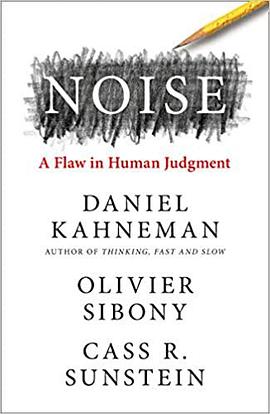Noise
内容简介
From the best-selling author of Thinking, Fast and Slow, the co-author of Nudge, and the author of You Are About to Make a Terrible Mistake! comes Noise, a revolutionary exploration of why people make bad judgments, and how to control both noise and cognitive bias.
Imagine that two doctors in the same city give different diagnoses to identical patients - or that two judges in the same courthouse give markedly different sentences to people who have committed the same crime. Suppose that different interviewers at the same firm make different decisions about indistinguishable job applicants - or that when a company is handling customer complaints, the resolution depends on who happens to answer the phone. Now imagine that the same doctor, the same judge, the same interviewer, or the same customer service agent makes different decisions depending on whether it is morning or afternoon, or Monday rather than Wednesday. These are examples of noise: variability in judgments that should be identical.
In Noise, Daniel Kahneman, Olivier Sibony, and Cass R. Sunstein show the detrimental effects of noise in many fields, including medicine, law, economic forecasting, forensic science, bail, child protection, strategy, performance reviews, and personnel selection. Wherever there is judgment, there is noise. Yet, most of the time, individuals and organizations alike are unaware of it. They neglect noise. With a few simple remedies, people can reduce both noise and bias, and so make far better decisions.
Packed with original ideas, and offering the same kinds of research-based insights that made Thinking, Fast and Slow and Nudge groundbreaking New York Times best sellers, Noise explains how and why humans are so susceptible to noise in judgment - and what we can do about it.
......(更多)
作者简介
丹尼尔·卡尼曼(Daniel Kahneman)
诺贝尔经济学奖得主,美国总统自由勋章获得者,全球畅销书《思考,快与慢》作者,普林斯顿大学尤金·希金斯心理学(Eugene Higgins Professor of Psychology, Princeton University)荣誉退休教授,公共和国际事务学院(School of Public and International Affairs)教授,曾荣获多项奖章,包括美国心理学学会颁赠的心理学终身贡献奖。卡尼曼在心理学上的成就是挑战判断与决策的理性模式,被公认为“继弗洛伊德之后,当代最伟大的心理学家”。他的跨领域研究对经济学、医学、政治学、社会学、社会心理学、认知科学等领域都产生了深远的影响,被誉为“行为经济学之父”。
奥利维耶·西博尼(Olivier Sibony)
巴黎高等商学院(HEC Paris)教授,牛津大学赛德商学院(Saïd Business School, University of Oxford)外籍教授,曾在全球最大的战略咨询公司——麦肯锡咨询公司(McKinsey & Company)担任资深合伙人长达25年时间。西博尼的研究领域为策略、决策、问题解决,力图提升决策的品质,论文发表在众多优秀刊物之上,包括《哈佛商业评论》(Harvard Business Review)与《麻省理工学院斯隆管理评论》(MIT Sloan Management Review)。其中2011年6月,与卡尼曼合著的文章Before You Make That Big Decision曾登上《哈佛商业评论》选集封面。著有You Are About to Make a Terrible Mistake一书,致力于揭示:偏差是如何影响我们的决策的,而我们又应该如何应对偏差。
卡斯·R. 桑斯坦(Cass R. Sunstein)
哈佛大学法学院教授,行为经济学与公共政策研究项目创始人兼主任,主要研究领域为政策制定方面。2009—2012年任美国白宫信息与监管事务办公室(White House Office of Information and Regulatory Affairs)主任;2013—2014年加入白宫情报与通信技术审查小组(Review Group on Intelligence and Communications Technologies);2016—2017年加入美国国防部国防创新委员会(Defense Innovation Board)。著有多本《纽约时报》畅销书,包括与理查德·泰勒合著的《助推》(Nudge)、基于电影《星球大战》(Star Wars)的法学著作《星球大战的世界》(The World According to Star Wars),以及《助推2.0》(How Change Happens)等其他多本著作。
......(更多)
目录
Introduction: Two Kinds of Error
Part I: Finding Noise
1. Crime and Noisy Punishment
2. A Noisy System
3. Singular Decisions
Part II: Your Mind Is a Measuring Instrument
4. Matters of Judgement
5. 5. Measuring Error
6. The Analysis of Noise
7. Occasion Noise
8. How Groups Amplify Noise
Part III: Noise in Predictive Judgements
9. Judgements and Models
10. Noiseless Rules
11. Objective Ignorance
12. The Valley of the Normal
Part IV: How Noise Happens
13. Heuristics, Biases, and Noise
14. The Matching Operation
15. Scales
16. Patterns
17. The Sources of Noise
Part V: Improving Judgements
18. Better Judges for Better Judgements
19. Debiasing and Decision Hygiene
20. Sequencing Information in Forensic Science
21. Selection and Aggregation in Forecasting
22. Guidelines in Medicine
23. Defining the Scale in Performance Ratings
24. Structure in Hiring
25. The Mediating Assessments Protocol
Part VI: Optimal Noise
26. The Costs of Noise Reduction
27. Dignity
28. Rules of Standards?
Review and Conclusion: Taking Noise Seriously
Epilogue: A Less Noisy World
Appendix A: How to Conduct a Noise Audit
Appendix B: A Checklist for a Decision Observer
Appendix C: Correcting Predictions
Acknowledgements
Notes
Index
......(更多)
读书文摘
Selective attention and selective recall are a source of variability across people.
当权力要使人们遗忘的时候,音乐是仪式的牺牲,是替罪羔羊;当它要大众相信时,音乐是法规,是再现;当它要使大众消音时,音乐是再生产的、规格化的重复。
在其中一个区域中,音乐似乎生于仪式、用于仪式,目的在使人们遗忘普遍的暴力;在另一个区域中,音乐是用来使人们相信世界和谐的存在,相信在交换中有秩序,而且在商业权力中有合法性的存在;在最后一个区域中,音乐的作用是藉由大量生产震耳欲聋、折衷的音乐来达到沉寂,使所有其他人类的噪音消音。
......(更多)






